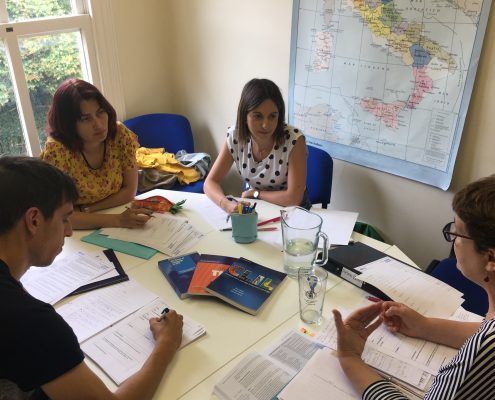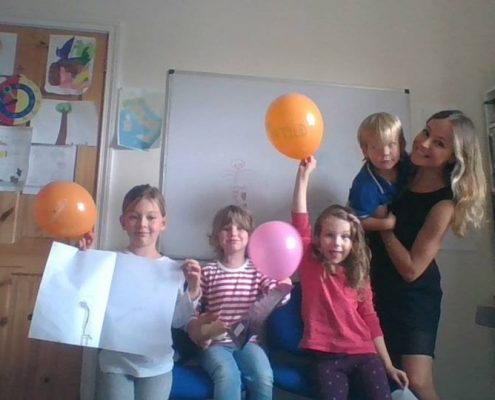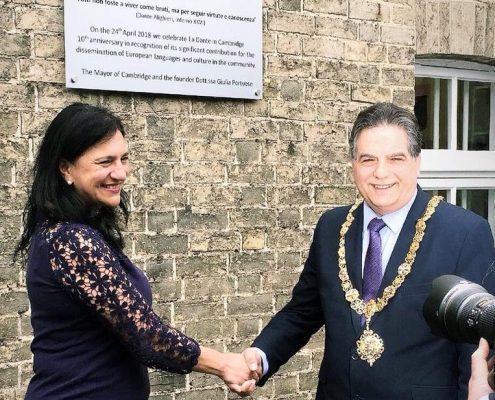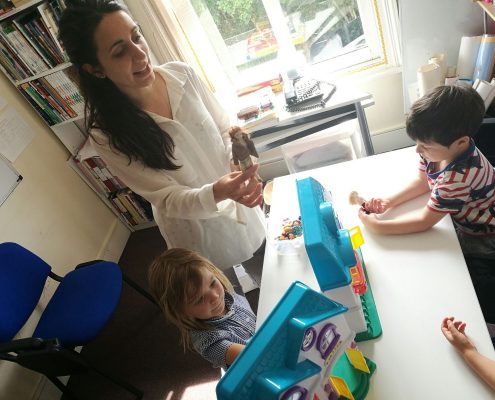Latest news at La Dante in Cambridge
Consult our blog to get latest news!

CLIL: practical tips for teachers
English, Italian, SpanishIs there a recipe for CLIL? Much has been written on what CLIL is and why to do it but there is very little practical guidance on how to plan and teach CLIL lessons.

Pinocchio Project at La Dante - Overcoming the challenges of raising bilingual children
ItalianAt La Dante, we strive to make children and parents who come here feel that we are an enlarged Italian family in the heart of Cambridge, where learning comes naturally.

The mayor George Pippas unveiled a commemoration plaque for the 10th anniversary of La Dante in Cambridge
English, Italian, SpanishThe event marked the significant contribution the European Cultural Centre La Dante in Cambridge has had in the community promoting and disseminating language learning and culture

La Dante in Cambridge celebrates its 10th anniversary on February 24th and on April 24th
English, Italian, SpanishThe European Cultural Centre La Dante in Cambridge, a not-for-profit cultural association recognised by Dante Alighieri Society in Rome (Italy), is celebrating its 10th anniversary this year.

Imparare l'italiano alla Dante e'...un gioco da ragazzi!
ItalianMolti genitori, pensando al futuro dei propri figli in una societa’ sempre piu’ globalizzata, decidono di fare loro un enorme regalo: l’apprendimento di una lingua straniera. Il bilinguismo è innegabilmente una grande ricchezza, in quanto…

Thinking in a Foreign Language: How to Do It and Why
English, Italian, SpanishThinking in a foreign language is an important step in the long road that is fluency in a foreign language, but it’s a step that, for some reason, many language learners tend to ignore. Thinking in the language you are learning is not…
More aticles below





LEARNING LANGUAGES ONLINE DURING LOCKDOWN
English, Italian, SpanishWhy study a new language now is a good idea
Cambridge Central Library
My experience abroad began a few years ago. From Italy I moved to the Uk in 2013. After the first year in London, I found new opportunities in Cambridge. Despite the difficulties that a completely new life in a different country from your own has entailed, now, I can tell that the latest have been years of great enrichment. One of the biggest frustrations on arriving in Britain, of course, involved the language. For a sociable Neapolitan “communicator” and journalist who loves the Italian language like me, I can assure you that not being able to express myself with the surrounding world was a terrible feeling. The language we use, completely permeates our life, our interactions, as well as our way of seeing things and our freedom. Without this fundamental tool you feel lost. Now, after many courses, some exams, a Master’s degree at the Anglia Ruskin University in Cambridge, and some work experiences in the UK, I can say that I am totally grateful for the path I have taken which forced me to master my second language. The motivation to learn is important of course. Given my low level of love for the new language at the time, it came to my rescue the fact that, to some extent, I find myself forced to learn and practice English by the kind of life I had chosen: a new working and personal life in England. After all, I had always wanted to be able to use English, the most widespread language in the world, the ‘wildcard’ language, as I have always defined it. It happened during a trip to Norway, entering a little shop in Bergen, I missed a pair of earrings that I wanted to buy, but which, due to my insecurity in the language, was secured by another tourist, or when I found myself for work in New York, and I could not exchanged more than a couple of sentences with some people in a pub. The same happened when a group of American tourists tried to interact with me in Italy, on the island of Procida where I was during my summer holidays. It was embarrassing. Of course, knowing English makes you feel like a citizen of the world, a confident human being able cto ommunicate with anyone. The potential of a language that is so useful and influential even in the professional field, can seriously make you feel capable of crossing doors almost anywhere. English is the most widely spoken language in the world, used by more than a quarter of the world population.
And therefore, I went from being too insecure even to order a coffee in any London bar, to working in a language school, as well as a European cultural center. At La Dante in Cambridge, where I have been working for a few years, I have certainly perfected my haltingly English, through phone calls, emails, marketing campaigns, presentations, social and cultural events and even radio broadcasts (the bilingual broadcasts of Radio Dante).
Cambridge, Uk
La Dante in Cambridge, which is one of the foreign branches of the Dante Alighieri Society, the Italian cultural institution that aims to protect and spread the Italian language and culture in the world, has allowed me to continue to have the fundamental bond with my country and its culture I needed, and at the same time to come into contact with cultures different from mine in an environment made up of people who love languages. ‘A different language is a different vision of life’, said the Italian film director Federico Fellini. It is definitely true. Language learning, in addition to the pleasure and opportunities it provides, is also known to be linked to a better mental health: it prevents cognitive decline by reducing the risk of Alzheimer’s or dementia, for example. This is because people who speak at least two languages develop their temporal lobes, which allow for the formation of new memories. This increases the number of neurons that make up our brain. In addition, people who speak more than one language become better at ‘problem solving’, at better analyzing their environment and at carrying out more activities simultaneously (multitasking). These are undoubtedly some of the benefits that bilingual or multilingual people can enjoy. Neuroplasticity, that is the ability of the nervous system to modify itself to form nerve connections, is greater in children, but the brains of adults can also be shaped and improved. So it’s really never too late to challenge yourself and have a super brain! You think that most of the students of Italian at La Dante in Cambridge are really ‘very adults’, mostly retirees or academic professors. They are passionate, good at always making new progress, and are more than awake and active.
BBC, Cambridge, Uk
I personally got a taste for it too and, since this new era of smart working and lockdown began, I took advantage and started studying Spanish with online courses, always with mother tongue teachers from La Dante in Cambridge. Nothing more pleasant. Even after a busy day of work, nothing is more comfortable than staying in the warmth of your own home, without having to travel in the cold or for a long ride by car, etc. I take a seat in my living room for a couple of hours with classmates of all nationalities (in my class at the moment there are two Turks, one Russian and one English for example) and my very nice Spanish teacher. Leisure, together with the feeling of using your time productively in something that contributes to your personal and cultural growth, do the rest. Obviously I am looking forward to going to Spain to communicate with the locals in the local language, but for now, safe from viruses, I have been preparing myself for that moment.
I conclude with a quote from Francois Vaucluse who said: ‘Forgive them who speak only one language: they do not know what they do’. My wish for this new year to you is therefore to commit yourselves to learning a new language or to practice and deepen a second or third language that you already know or that you had started learning at school.
INFORMATION ON ONLINE COURSES
E-learning is as much, if not more effective than in-person lessons. The language courses of La Dante in Cambridge take place on Zoom with the help of Google Classroom and the use of the new online school platform, PLATEO, where all students can easily interact with each other and with teachers. Furthermore, with this new platform, all users, in addition to teachers, can easily share documents, videos, language tests and many other files to improve the learning experience and push all skills to the best.
Since La Dante is a European Cultural Center, together with language courses, it also offers all its students many cultural events and extra activities, completely free to offer an experience as immersive as possible (conversation classes, cooking classes, aperitifs online, film club). The teachers, of English, Spanish or Italian, are all qualified native speakers who use an effective communication approach that encourages the students to speak in the language of study as much as possible.
Courses can be individual or group. The collective classes are formed by a few people in order to guarantee a higher level of individual attention to each student.
For more information or to register for English courses, english@ladante-in-cambridge.org, WhatsApp +44 7887 606227
For Spanish courses spanish@ladante-in-cambridge.org – – WhatsApp +44 7887 606227
For Italian courses for foreigners info@ladante-in-cambridge.org – WhatsApp +44 7887 606227
www.ladante-in-cambridge.org Radio Dante www.radiodante.org
Natale ai tempi del Covid-19 con i messaggi online a Santa Claus
ItalianIl Natale è una delle feste più sentite dell’anno. Durante questa ricorrenza, le città si riempiono di luci che illuminano le vie del centro e in molte zone sono allestiti mercatini, dove è possibile degustare cibi tipici e acquistare oggetti fatti a mano. In Italia le tradizioni sono varie, diffuse da nord a sud. A differenza di molti altri Paesi europei, qui si è soliti far coincidere l’inizio delle festività con il giorno dell’Immacolata Concezione, l’8 dicembre, giornata in cui si cominciano anche ad allestire il presepe e l’albero di Natale. In molti quest’anno si sono anticipati. E` stato un fenomeno abbastanza diffuso. Con più tempo da trascorrere in casa, con il desiderio di sentirci meglio e di colorare in qualche modo queste giornate dai toni grigi, molti hanno fatto prima del solito, già alla fine del mese di novembre. Quanto riscaldano le lucine colorate degli alberi di Natale? Ci riportano istantaneamente a quando da bambini tuffavamo lo sguardo tra i rami dell’abete nell’attesa che Babbo Natale ci portasse i suoi doni. Questa tradizione legata all’albero natalizio ha origini antiche. C’è chi fa risalire le sue origini al 1441, quando nella piazza centrale del Municipio di Tallin, in Estonia, fu eretto un abete gigantesco attorno al quale giovani single ballavano in gruppo alla ricerca dell’anima gemella, e chi invece al XIII secolo, a Basilea, in Svizzera. In Italia si diffuse nella seconda metà dell’Ottocento grazie alla Regina Margherita di Savoia che ne fece addobbare uno nel Palazzo del Quirinale, dando il via a una vera e propria moda che si diffuse rapidamente in tutta la penisola. La tradizione vuole poi che l’albero si tolga, insieme a presepe e decorazioni, il 6 gennaio. Molti hanno addobbato i propri abeti, simbolo di convivialità, famiglia e amore durante le feste, in solitaria “Quest’anno non sarà come gli altri, ma il Natale è la festa della rinascita e della speranza” – ci ha detto qualcuno. Natale 2020 naturalmente, a causa della pandemia da Covid-19, non sarà come i precedenti e non si potranno prevedere veglioni, festeggiamenti, baci e abbracci. A tavola ci potranno essere massimo sei parenti stretti: sarebbero queste le nuove raccomandazioni e regole per le festività. Anche la Messa del 24 notte fara` i conti con l’ultimo Dpcm. La sera della vigilia di Natale, infatti, si dovrà rientrare presso la propria abitazione entro le 22:00. La messa di Natale sarà quindi anticipata alle 20:00.
Zampognaro scozzese a Londra
Sara`un Natale dall’aspetto nuovo e particolare: anche gli Zampognari, figure amate e molto diffuse nell’Italia centro-meridionale, che nel periodo natalizio girano per le strade suonando lo strumento antico della zampogna dovranno indossare la mascherina naturalmente o tenersi lontani dalla folla mentre suonano. Questo senz’altro però non li fermerà dall’allietare le strade con la loro musica.
Insomma, che questo sarà un Natale in sicurezza e all’insegna del distanziamento è fuor di dubbio anche per tutti i Babbo Natale che incontrano centinaia di bambini ogni anno. Ma nulla è perduto. Da tutto questo, infatti, è nata un’iniziativa particolare, “Dillo con Babbo Natale” (Say it with Santa). In cosa consiste? Chiunque potrà chiedere a Babbo Natale in Finlandia, tramite il sito online, di trasmettere il proprio messaggio di positività e affetto ai propri cari e amici, tutto ciò che basta in questo momento. Babbo Natale ha già ricevuto migliaia di messaggi che saranno raccolti in un video che sarà condiviso sui social. Detto questo, auguriamo a tutti un Natale sereno e sicuro con ciò che, come ci ha insegnato questo periodo complicato, davvero conta nella vita: amore, buoni sentimenti e famiglia.
Carlotta Casolaro
Discover Radio Dante!
English, Italian, SpanishRADIO DANTE HISTORY
Radio Dante started to be broadcast on 3rd March 2012, founded by Director Dr. Giulia Portuese-Williams of the European Cultural Centre La Dante in Cambridge. The main objective of La Dante is the dissemination of European languages and cultures, in particular Italian, Spanish and English.
In 8 years, we have produced more than 100 radio programmes, trained 60 interns in radio broadcasting and marketing, built collaborations with Colleges and Universities all over Europe and with La Dante Alighieri Society’s 500 offices around the world.
TRILINGUAL PODCASTS
Radio Dante broadcasts every two weeks with half an hour in English and half an hour in Spanish or Italian on Cambridge 105 radio. We also publish our podcasts on Radio Dante’s website, on La Dante in Cambridge’s website, on Spotify , on our Facebook account and on other social media.
THEMES
We cover cultural themes on our radio programmes:
We broadcast from classical to pop music. Moreover, we interview professional musicians who speak about their music, their artistic journey.
Knowing our roots allows us to discover the historical links that bind us to other countries. Our team is made up of people of different nationalities, which enriches the historical topics our journalists cover.
PERSONAL DEVELOPMENT
We also offer our listeners advice on language learning and other topics to enrich their lives and develop their skills.
TRADITIONS
To know the traditions of a community is to understand the way in which they relate among family, friends and the environment. Thanks to the multiculturalism of our team, we can tell our listeners all about the traditions of each region from different perspectives.
Pictures of our team at the broadcast studio
PARTNERSHIPS
We have been working for the past 8 years with the Department of Italian and the Department of Spanish at Cambridge University where academics often come and participate to interviews (this has happened prior to the pandemic).
Over 60 University Students chose us for a successful professional internships over the years, knowing the work experience at La Dante is valuable and well regarded all over the world. We have partnerships with the Universities of Valencia, Madrid, Zaragoza, Seville in Spain as well as the Universities of Venice, Bologna, Florence, Rome and Siena in Italy.
RECOGNITIONS
We are recognized by the British Government and by La Dante Alighieri Society, which is a a Cultural non-for-profit organization with 500 offices around the world.
7 Reasons to Learn a New Language
English, Italian, SpanishWHY STUDY ANOTHER LANGUAGE?
AND WHY STUDY ITALIAN OR SPANISH?
1. Connect!
One of the most rewarding aspects of the human experience is our ability to connect with others. Being able to communicate with someone in his or her language is an incredible gift. Bilinguals have the unique opportunity to communicate with a wider range of people in their personal and professional lives.
2. Advance Your Career
Language skills can be a significant competitive advantage that sets you apart from your monolingual peers. Learning a second language also opens additional doors to opportunities for studying or working abroad.
3. Feed Your Brain
The many cognitive benefits of learning languages are undeniable. People who speak more than one language have improved memory, problem-solving and critical-thinking skills, enhanced concentration, ability to multitask, and better listening skills. They switch between competing tasks and monitor changes in their environment more easily than monolinguals, as well as display signs of greater creativity and flexibility. If that weren’t enough, as we age, being bilingual or multilingual also helps to stave off mental aging and cognitive decline.
are undeniable. People who speak more than one language have improved memory, problem-solving and critical-thinking skills, enhanced concentration, ability to multitask, and better listening skills. They switch between competing tasks and monitor changes in their environment more easily than monolinguals, as well as display signs of greater creativity and flexibility. If that weren’t enough, as we age, being bilingual or multilingual also helps to stave off mental aging and cognitive decline.
4. Deepen Your Connection to Other Cultures
Language is the most direct connection to other cultures. Being able to communicate in another language exposes us to and fosters an appreciation for the traditions, religions, arts, and history of the people associated with that language.
5. See the World
Traveling as a speaker of the local language can revolutionize a trip abroad. While monolingual travelers are capable of visiting the same places, travelers who know more than one language are more easily able to navigate outside the tourist bubble and to connect and interact with the place and its people in a way that is often inaccessible to those without the language.
6. Boost Your Confidence
Any language learner can attest to making his or her share of mistakes while discovering a new language—often in front of an audience. It’s a necessary part of the learning process! Learning a language means putting yourself out there and moving out of your comfort zone. The upside is the amazing sense of accomplishment you’ll feel when conversing with someone in their native language.
7. Gain Perspective
As we explore a new language and culture, we naturally draw comparisons to what is most familiar. Learning about another culture sheds light on aspects of our own culture—both positive and negative—we may not have previously considered. You may find a greater appreciation for what you have, or you may decide to shake things up!
Aprendizajes y celebraciones en una cuarentena
SpanishEntrevista a Claudia
España ha sido uno de los países más afectados por el Coronavirus a nivel mundial. De marzo a junio, la totalidad del país se vio sumido en una estricta cuarentena de 3 meses y 15 días, lo que constituyó un hito sin precedentes para toda la población.
Se han visto múltiples noticias a nivel internacional, sin embargo, ¿cómo fue vivir la experiencia realmente? Claudia, una adolescente de 17 años, nos responde a cómo fue vivida la cuarentena desde su pueblo en el Alto Palancia, Altura.
Altura es un pueblo del interior de España de aproximadamente 3500 habitantes, con costumbres y festividades muy arraigadas en las que participa activamente toda la población autóctona y la de los municipios vecinos. Esto ha creado, a lo largo de los años, un fuerte sentimiento de comunidad que también comparte Claudia, ya que es alturana y ha vivido toda su vida en este entorno: “Nos apoyamos mucho los unos a los otros y la pandemia me ayudó a saber cuáles eran las personas que verdaderamente me importaban”, afirma la entrevistada.
No obstante, en un inicio, se le vino el mundo encima al enterarse de que tendrían que estar confinados: “Soy consciente de que no volveré a tener esta edad y pensé que este sería un año perdido. Sin embargo, conforme fueron pasando los meses, a pesar de que tuve muchos momentos de crisis, aprendí muchas cosas. La primera fue una nueva forma de vivir la música”.
“Tan siquiera sabía que había altavoces distribuidos por todo el pueblo, pero no hubo un día en el que no se escuchara música. Durante 30 o 40 minutos, a las 6 de la tarde, se escuchaba tanto Flying Free, Un beso y una flor o canciones de La Bella y la Bestia”.
Claudia nos cuenta la importancia de la música durante la cuarentena, ya que sirvió para unir y animar a la gente a pesar de la distancia. Asimismo, nuestra entrevistada forma parte de la banda musical de Altura, a través de la cual los miembros se animaron los unos a los otros enviándose vídeos para seguir compartiendo su pasión por la música ante la imposibilidad de reunión.
“Tampoco se pudieron celebrar las fiestas como siempre, así que inventamos nuevas formas de vivirlas a través de la música. Con motivo de San José, todos los músicos de la Comunidad Valenciana salimos a los balcones a tocar “Amparito Roca” y “Paquito el Chocolatero”. Había un directo en Internet para poder seguirlo. Fue muy emocionante sentir cómo nuestra esencia de celebración, fiesta y tradición no podía perderse”.
La entrevistada afirma que uno de los mejores recuerdos del confinamiento fueron los carnavales online que acabaron surgiendo de forma espontánea entre los jóvenes del Alto Palancia: “Inicialmente, usábamos Houseparty para estar en contacto con nuestros amigos, y como las llamadas eran abiertas, acababan entrando otras personas del Alto Palancia para animarnos y darnos fuerzas los unos a los otros. No sabemos cómo ocurrió, pero esto llevó a una especie de carnaval online diario, donde la gente entraba disfrazada a las conversaciones y el resto tenía que adivinar quiénes eran. Es una de esas cosas especiales que jamás me habría esperado que ocurriese. Acabamos todos disfrazados, disfraces en ocasiones verdaderamente originales y divertidos, riéndonos y fortaleciendo vínculos con personas con las que tal vez no teníamos tanta relación”.
La tradición más importante en Altura es la del Berro, celebrado el 25 de marzo. Esta debía de haberse celebrado unos días después de que empezase la cuarentena en España, pero los alturanos, decidieron que no se quedarían sin celebrar una de sus fiestas más importantes: “Ya que no teníamos muchas formas de poder expresar que estábamos celebrando el nacimiento del Berro, decidimos salir con cacerolas a nuestras ventanas para crear una mascletá antes de que Zarzoso tirara la oficial. Las camareras de la fiesta tiraron fuegos artificiales y la banda salía a sus balcones a tocar los pasodobles tradicionales. ¡Teníamos que celebrar nuestra fiesta, hombre!”.
Con la llegada del verano llegó también una “nueva normalidad” al territorio español, y ante la imposibilidad de hacer las mismas cosas que otros años, Claudia aprendió a vivir el verano de una forma distinta: “Estuvimos mucho más en contacto con la naturaleza. No podíamos salir de fiesta, pero descubrimos que había tantos sitios a los que ir: miradores, montañas, playas, calas… En definitiva, ha sido un verano increíble”.
Claudia actualmente estudia el último año de bachiller, por lo que confiesa estar inquieta ante la posibilidad de que esta situación pueda afectar a su futuro en la universidad: “Estamos todos un poco perdidos y tampoco los profesores saben qué decirnos”.
Por otro lado, la entrevistada espera no tener que volver a una situación de confinamiento, aunque sí considera que la pandemia ha tenido su parte positiva: “Tanto para lo bueno como para lo malo, voy recordar por siempre este año y todas las cosas que he aprendido. Es extraño, pero cuanto más inestable es tu entorno, más fuertes se hacen los vínculos con las personas que te quieren y a las que quieres. Ahora ya sé que aunque cosas negativas e incontrolables ocurran, tengo no solo a mi familia y amigos, sino a toda una comunidad que se hace fuerte ante las adversidades”.
In tutto il mondo si avviano le celebrazioni per i 700 anni dalla morte di Dante Alighieri
ItalianTra pochi mesi entreremo nell’anno in cui ricorrono i settecento anni dalla morte di Dante Alighieri, avvenuta nel 1321. Agli inizi di settembre si sono aperte le celebrazioni nazionali di questo importante Settecentesimo anniversario, alla presenza del presidente della Repubblica, Sergio Mattarella, a Ravenna, luogo in cui morì il Sommo Poeta (il servizio del Tgr Toscana). Per l’occasione è stata restaurata la tomba e la serata si è conclusa con il canto XXXIII del Paradiso, l’ultimo della Divina Commedia, recitato dall’attore Elio Germano. Il ricco calendario di iniziative dedicate al padre della lingua italiana riguarderà non solo Ravenna e la regione Emilia Romagna, ma l’intero Paese. Fino a settembre 2021, infatti, saranno coinvolti circa 70 comuni e molti luoghi legati a Dante, come il castello di Gradara, la rocca che secondo la leggenda ha fatto da sfondo al tragico amore di Paolo e Francesca di cui e` raccontato nella Divina Commedia.
“Commemorare Dante”, ha detto Alessandro Masi, segretario generale della Società Dante Alighieri, ”significa rendere omaggio al padre della nostra lingua e ad un caposaldo della letteratura europea e mondiale. Significa anche celebrare il simbolo che racconta al mondo l’Italia, il suo umanesimo e la sua identità fatta di bellezza e accoglienza”.
Chi era Dante Alighieri sommo poeta
Nato a Firenze nel 1265, Dante (battezzato Durante di Alighiero degli Alighieri) è considerato il padre della lingua italiana e uno dei simboli più rappresentativi della nostra cultura in tutto il mondo. La sua “Comedìa”, divenuta famosa come Divina Commedia, da secoli è considerata la più grande opera scritta in lingua italiana e uno dei capolavori della letteratura mondiale. Descrive un viaggio nell’aldilà, toccando con mano i drammi e le sofferenze dei dannati, le pene a cui sono sottoposti (a seconda dei peccati di cui si sono macchiati) e le glorie cui hanno diritto. Un viaggio nella storia e nell’uomo, tra emozioni, speranze e sentimenti eterni.
A ravvivare ogni anno la memoria del poeta, c’è, dallo scorso, anno una giornata nazionale dedicata a lui, il Dantedì, nato su proposta del Ministero per i Beni e le attività culturali e per il Turismo, che si celebrera`ogni 25 marzo.
Anche lo scorso anno quindi, ci sono state celebrazioni in tutta Italia, quando tutti furono simbolicamente chiamati a leggere alcuni versi della Commedia di Dante Alighieri.